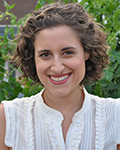2011, 2018
Emily Zazulia
- Assistant Professor
- University of California, Berkeley

Abstract
The notation of fifteenth-century music often features curious inscriptions that prescribe transformations of written counterpoint—from simply slowing down a given line to turning it backwards or even upside-down. Such intricate notation, which can appear by turns unnecessary and confounding, challenges traditional conceptions of music writing. This dissertation reconsiders key repertoires, accounting for the ways that visual concerns shape aural results. Furthermore, it situates these convoluted practices in a culture of enigmatic writing that emerged around 1500, including newfound interest in cryptography, emblematics, and hieroglyphics. In viewing notation as a complex technology that did more than record sound, the project offers a new approach to music’s literate traditions in the early renaissance.
Abstract
This project expands the notion of musical aesthetics to include visual elements. Whereas music is typically appreciated as sound, some fifteenth-century pieces also invite engagement on the page in order to arrive at a still subtler aesthetic experience. For a long time, interest in musical notation has extended only as far as practical knowledge demanded. Yet it is not enough to know the content of what notation conveys; understanding how composers and scribes transmitted some of the period’s most complex music stands to change ontological conceptions of this repertory. In turn, these cases open up to larger questions that concern musicologists and scholars of all stripes. How is experience shaped by the intermediary of writing? What is the relationship between a musical creation and the tools available to create it? How can issues of cultural literacy be overcome at such great historical remove?

